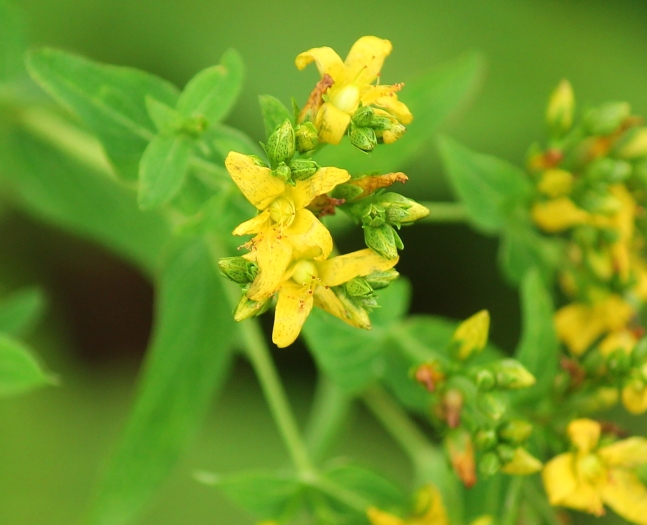Spotted St. John’s Wort
(Hypericum punctatum)
Spotted St. John’s Wort (Hypericum punctatum)
/
/

© mayfly1963
CC BY 4.0
Image By:
© mayfly1963
Recorded By:
Copyright:
CC BY 4.0
Copyright Notice:
Photo by: © mayfly1963 | License Type: CC BY 4.0 | License URL: http://creativecommons.org/licenses/by/4.0/ | Uploader: mayfly1963 | Publisher: iNaturalist |



















































Estimated Native Range
Summary
Hypericum punctatum, commonly known as Spotted St. John’s Wort, is a perennial herb that is native to open woodlands, meadows, and grassy roadside areas across eastern North America, including the eastern United States and southern Canada. This species typically grows to a height of 50–100 cm (20–39 in) and is characterized by its erect stems and dotted leaves. The bright yellow flowers, which bloom from July to August, are 2.5 cm (1 in) in diameter with black dots along the margins and are quite showy, attracting pollinators. The fruits are small, dry capsules that ripen from early September to October.
Spotted St. John’s Wort is valued for its medicinal properties, as well as its ornamental appeal due to its cheerful flowers and its ability to attract a variety of bees, including the American bumblebee and sweat bees. It is commonly used in naturalistic plantings, wildflower gardens, and as a component in pollinator-friendly landscapes. This herb thrives in full sun to part shade and prefers soils with medium moisture and good drainage. While generally easy to maintain, it can be susceptible to rust and leaf spot diseases. It is not known to be invasive and does not have aggressive roots, making it a safe choice for most garden settings.CC BY-SA 4.0
Spotted St. John’s Wort is valued for its medicinal properties, as well as its ornamental appeal due to its cheerful flowers and its ability to attract a variety of bees, including the American bumblebee and sweat bees. It is commonly used in naturalistic plantings, wildflower gardens, and as a component in pollinator-friendly landscapes. This herb thrives in full sun to part shade and prefers soils with medium moisture and good drainage. While generally easy to maintain, it can be susceptible to rust and leaf spot diseases. It is not known to be invasive and does not have aggressive roots, making it a safe choice for most garden settings.CC BY-SA 4.0
Plant Description
- Plant Type: Herb
- Height: 1.5-3.2 feet
- Width: 0.469-1 feet
- Growth Rate: Moderate
- Flower Color: Yellow
- Flowering Season: Summer
- Leaf Retention: Deciduous
Growth Requirements
- Sun: Full Sun, Part Shade
- Water: Medium
- Drainage: Medium
Common Uses
Bee Garden, Bird Garden, Butterfly Garden, Deer Resistant, Groundcover, Low Maintenance, Showy Flowers
Natural Habitat
Native to open woodlands, meadows, and grassy roadside areas across eastern North America
Other Names
Common Names: Corymbed St. John’s-Wort , Spotted St. John’s-Wort , Dotted St. John’s-Wort , Millepertuis Ponctué
Scientific Names: Hypericum punctatum , Hypericum punctatum var. punctatum , Hypericum corymbosum , Hypericum maculatum , Hypericum punctatum f. subpetiolatum , Hypericum micranthum , Hypericum punctatum f. punctatum , Hypericum subpetiolatum , Hypericum maculatum var. corymbosum , Hypericum maculatum var. heterophyllum
GBIF Accepted Name: Hypericum punctatum Lam.